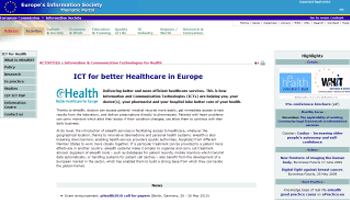 Telemedicine can help increase accessibility to healthcare for patients living in remote geographical areas, allow patients with chronic diseases to be monitored at home and involve patients in the management of their own healthcare.
Telemedicine can help increase accessibility to healthcare for patients living in remote geographical areas, allow patients with chronic diseases to be monitored at home and involve patients in the management of their own healthcare. However, despite the potential benefits identified and the potential for growth of the market, the use of telemedicine applications in everyday medicine is still relatively low. One of the reasons identified is the lack of legal clarity. In view of enhancing legal clarity regarding telemedicine services, the Commission will publish a Staff Working Paper (SWP) on Community legal framework applicable to telemedicine in 2010.
On 4 November 2008 the Commission adopted the Communication on telemedicine for the benefit of patients, healthcare systems and society. In this Communication the Commission undertook to publish, in cooperation with Member States, an analysis of the Community legal framework applicable to telemedicine services. This was listed in the Communication as an action aimed to bring legal clarity to telemedicine.
The Communication was followed by an explanatory document [Commission Staff Working Document - SEC(2009)943 final] that includes details of the extensive consultation process which led to the Communication.
Also relevant as a background for the present EC initiative are two studies on legal aspects of eHealth available on the website of the Commission. The Legally eHealth study addresses the need to establish greater legal certainly in Europe with respect to the practice of eHealth service delivery and the use of eHealth tools focusing on the existing legal framework of relevant EU legislation. The study on the Legal framework of Interoperable eHealth in Europe focuses more on individual Member States' legislation. It identifies and analyses the range of legal and regulatory frameworks for electronic health delivery and services in each Member State and proposes recommendations to facilitate cross-border service provision via eHealth applications. It also provides ten use cases of telemedicine services (such as the NHS Direct Telephone Line or the Barcelona Telemedicine Clinic).
Objective of the initiative
The main objective of this initiative is to enhance legal clarity for providers of telemedicine services by clearly identifying the scope, depth and borders of applicability of existing Community legal framework to telemedicine services. The dialogue with healthcare providers disclosed that awareness about which rules and norms currently apply to telemedicine is a primary precondition to boost
wider deployment of telemedicine services both within and across Member States' borders.
Issues to be addressed
During the consultations with the stakeholders on the subject of telemedicine, several legal issues have been identified. These include: licensing, accreditation and registration of health professionals providing telemedicine services; reimbursement of costs for telemedicine services; liability; personal data protection and conflict of jurisdictions. The present EC initiative will provide guidance for telemedicine users on the Community legal framework applicable to these areas.
Envisaged structure of the SWP
The SWP will be composed of two main parts. The first part will present the Community legislation applicable to telemedicine services structured around the main problematic areas identified above. The second part will comprise a practical approach. It will present several cases of telemedicine services. These cases will be analysed by cross-reference to the relevant Community legislation presented in the first part.
For further information:
ICT for Health - European Commission - Information society and Media DG
Office: BU31 06/41 B-1049 Brussels
Email: This email address is being protected from spambots. You need JavaScript enabled to view it.
Tel: +32 (0)2 296 41 94
http://ec.europa.eu/information_society/eHealth